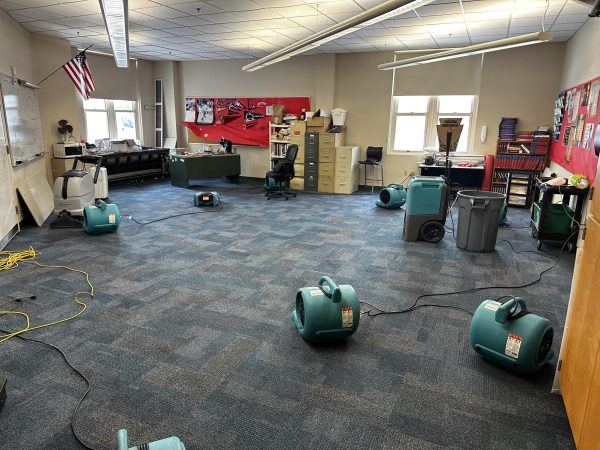
After a two-hour delay on the eighth of January, students arrived to see multiple classrooms flooded. Here at Ipswich High School, that is not a surprising sight. Every year, there seems to be a variety of incidents regarding the school’s infrastructure that leave students and faculty wondering: what causes these problems, and is there anything to be done about them?
There are several reasons why these problems occur. The most recent pipe burst resulted from a power outage the day prior. Without the power, the water stopped flowing, and so did the heat. As a result, the stagnant water froze and burst the pipe. Other problems though can have more profound causes in the construction of the building itself. An instance of this is the roof and its frequent leaks. With the roof being shingled at the high school, it was expected to have a lifespan of anywhere from 20 to 25 years. Given that the school was constructed 25 years ago, it becomes obvious why problems involving the roof are arising. In a similar vein, the age of the building can also account for issues ranging from faulty lights in the hallway to small electrical failures. That being said, the building is not that old compared to other facilities in town. The average United States public school is between 30 and 40 years old. With that in mind, the school could deteriorate faster than it should.
To answer this question, it is essential to look back at the construction of Ipswich High School. Crucially, during the construction, the company contracted to design and build the school went bankrupt. Unsurprisingly, this disrupted the entire project and forced the town to hire a second contractor to finish the school quickly. This fact offers some speculation on the question mentioned above. After all, if the town had to hire an additional contractor, they might have been forced to implement further cost-saving measures involving outdated or transient construction methods and systems. If this is true, it provides substantial evidence that the school is indeed deteriorating faster than a building of its age should. Additionally, contractors are usually selected by bidding for the lowest price among multiple contractors. Thus, contractors are generally the cheapest that they can obtain.
Beyond just the original construction, other problems have arisen from previous neglect. For instance, past managers did not properly maintain the HVAC system used to regulate climate control and ventilation. Because of this, it has required far more maintenance than usual. Similar unexpected upkeep acts eat away at the budget that could have been used on other projects had these systems been adequately maintained.
Regardless of what exactly causes these problems, the fact is that they are here, and they are disruptive to the education of many students. When asked about the issues dealt with by the school, senior Eva St. John explained, “With the pipes constantly leaking around the school, we have had to move around to different classes on short notice multiple times. It’s very disruptive to our education.” Furthermore, classes can often be tailored to specific teachers’ rooms and any materials in those rooms. When these rooms are flooded or inaccessible, whole lesson plans must be reworked. In one of the most recent incidents, both Mr. Ames and Ms. Slawson were relocated to the school library until their rooms had dried out. However on February 9th, action was taken as high school and middle school students received the day off from school. They used this day to fix the problems within the heating system.
Despite Ipswich High School’s many problems, there is still a hopeful future. The current crew overseeing the maintenance of the school has become very familiar with the building and is working on preventing these problems more than ever before. The school is working with a company to measure its water system and fit it with antifreeze. This measure would severely reduce the chance of future pipes bursting and classrooms flooding. On top of that, Assistant Facilities Director Brad Orme spoke about how “The superintendent has been very accommodating in the past with our funding.” This means it is very likely that future funding can be allocated to even more projects focusing on preventative maintenance within the building.



